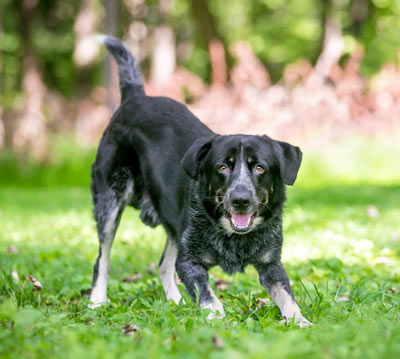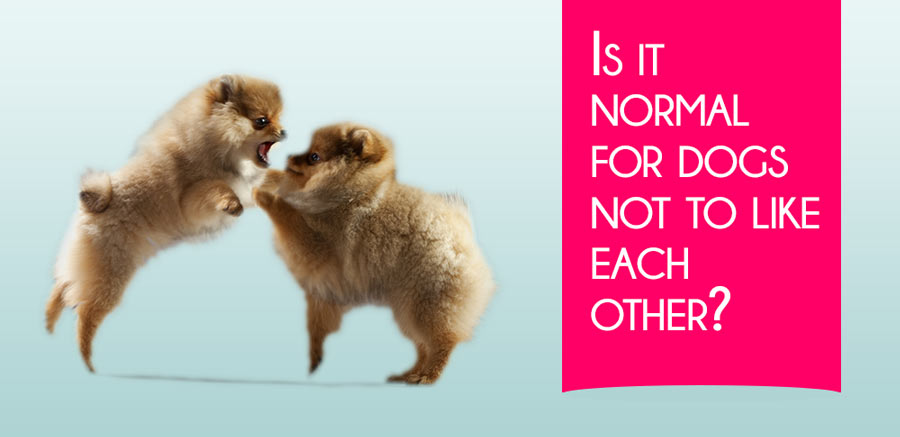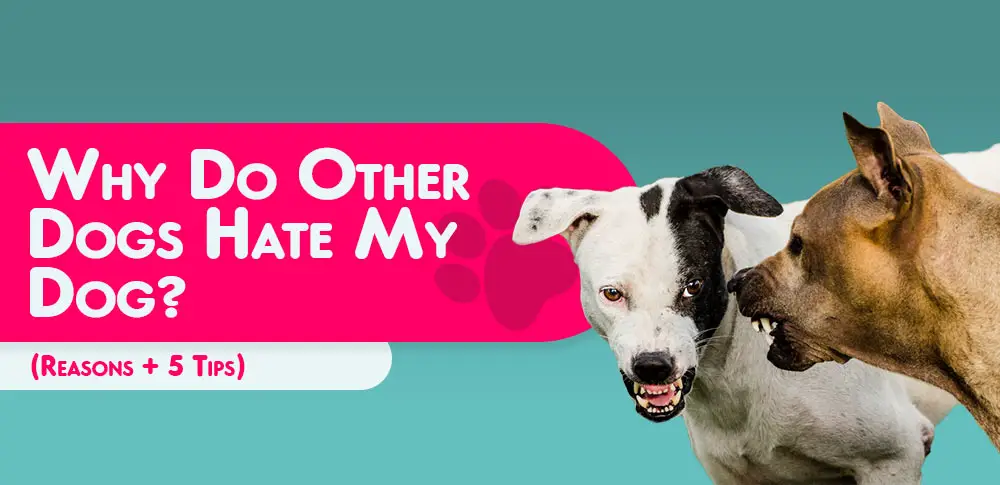Are you concerned about your dog being bullied by other dogs? This may have prompted you to wonder why do other dogs hate my dog? While this is a common concern among pet owners, this article will explore all the information you need to know about this issue.
While owning a dog can be extremely rewarding, it also presents its own unique set of challenges. One such difficulty arises when you see other dogs don’t like your dog or behave badly toward it. Especially if your dog is calm and well-mannered, this might be perplexing.
Why do other dogs hate my dog
Other dogs could hate your dog because of the size of your dog, its weird body language, scent or negative energy your dog is sending.
There are usually multiple reasons why other dogs might dislike your dog, and knowing them can help you avoid any potential harm or discomfort.
We’ve explained in details major reasons why other dogs may act badly or dislike your dog in this article. Read on to find out.
Why don’t other dogs like my dog
Breed size
Your dog’s breed or size might be a factor in why he’s disliked or hated by other dogs. Some canines are just predisposed to be apprehensive of other canines of a different size or breed, particularly if they have had bad encounters with them in the past.
Some canines may be timid around bigger canines, while others may be overly protective of their territory when confronted by smaller canines.
Dog scent
The way other dogs respond to your dog may also be influenced by your dog’s scent. Dogs’ sense of smell is very important to them, so if your dog has a strong scent or has been rolling about in something unpleasant, it may cause other dogs to respond negatively.
For instance, if your dog has been meddling with an animal that is perceived as prey, this may trigger a predatory response from other dogs. Similarly, if your dog has been playing with a rival dog, this can lead to confrontations by other dogs as well.
Your dog could be sending off bad energy or signs.
Dogs have a remarkable ability to assess new situations with remarkable speed. A dog’s dislike of other dogs is normal.
If a dog seems to dislike your dog, it may be because of your dog’s negative energy or messages; your dog’s anxiety, nervousness, or shyness might be seen as a weakness by other dogs.
In such situations, dogs, like some people, may attempt to correct anxious behavior in a way that backfires. This may be the cause of the negative reactions from other dogs.
So in simple terms, Your dog may be acting rudely in a manner that is understood by other dogs, and they may be asking him to “knock it off” or “probably go away.”
Suggested reading: Dog likes humans but not other dogs (Here’s Why!)
Even though dogs are naturally social creatures, not all of them have been socialized to interact with other dogs. Your dog may not know how to behave with other dogs if they weren’t properly socialized as puppies. Your dog’s behavior might be seen by other dogs as aggressive or impolite, which of course may be a reason why other dogs dislike your dog.
Your dog’s body language or posture could be a problem
Body language is a significant means of communication for both humans and dogs. Dogs utilize their body posture and movements to communicate with one another, much like we do with our voices, gestures, and facial expressions.
However, other dogs may not always interpret your dog’s posture as friendly or inviting. Some dog breeds, like Pit Bulls, Doberman Pinschers, and Rottweilers, may appear dominant and even dangerous to other animals simply by virtue of their body language or posture.
In the canine community, for instance, making direct eye contact with another dog is generally seen as a challenge or threat and may swiftly lead to a physical altercation. Erect ears, a high tail, and a bristly, stiff coat are further signs that a dog is ready to take action and may even seek dominance over other dogs.

Dogs might become defensive or even violent when confronted with another dog displaying dominating cues. This is due to the fact that these poses are seen as an attack on the dog’s hierarchy in the pack.
Your behavior around other dogs matters too.
A wide variety of factors may contribute to canine aggression and hostility towards your pooch. In most cases, the cause will be your dog’s behavior, but it might also be your response, which the dog will pick up on.
There are two possible outcomes when bringing your dog to a gathering of other dogs. One of them is making the decisions and letting your dog trust them. But if your less assertive or non-dominant behavior is counterbalanced by your dog’s high levels of energy, your dog may decide to take the wheel.
Now your dog is in an alert state, during which he or she may adopt a variety of dominating body postures and even attempt to challenge established social orders. The results would be disastrous.
Bad Behavior
There are instances when a dog’s behavior is undesirable in any setting, including with other dogs. Excessive yelping, pacing, or growling are all examples of such actions. If your dog exhibits any of these habits, it could be a reason why other dogs seem to hate or dislike him.
Fido probably doesn’t understand basic dog meeting routines
When two dogs meet for the first time, they perform a sophisticated ritual of communication using a wide range of senses. Scent is one of the most crucial since it helps canines recognize one another and evaluate danger.
When two dogs meet for the first time, they often perform a ritual called the “sniffing ritual.” To determine the other dog’s sex, age, health, and social position, the dogs will take turns smelling each other’s face, rear end, and other locations.
However, not all dogs are equally adept at recognizing these nuances, particularly those who have not had much practice socializing with other canines.
When meeting a new dog, some dogs may be too eager or excited and rush right in without going through the proper ritual of sniffing. Because of this, the new dog may be misunderstood as hostile or violent by the established pack.
Medical Issues
Your dog’s health condition may be the root of their unpredictable behavior, and other canines may respond negatively to this.
If your dog has a brain tumor, for instance, they may exhibit aggressive or otherwise abnormal behavior that the average dog just can’t manage. And just like you guessed, this could be a reason for other dogs to hate your dog and even pick up a fight.
Personality Clashes
Finally, it’s possible that your dog just has personality differences with other dogs. Dogs, like humans, have distinct character traits, likes, and dislikes that may cause conflicts with other canine companions. It’s possible that your dog won’t get along with other dogs that share its dominating or aggressive behavior.
Is it normal for dogs not to like each other?

It is not unusual for dogs to experience some level of conflict or discomfort around other dogs, even if they are socialized and well-mannered. A dog’s interactions with one another may be influenced by factors such as their unique personalities, preferences, and histories.
It’s possible that certain dogs are predisposed to be more territorial or protective than others, while others may experience anxiety or terror when among canine companions.
When your dog is around other dogs, you should keep a close eye on their actions and body language to make sure nothing dangerous or aggressive happens. Proper training, socialization, and management can help improve a dog’s comfort level around other dogs and reduce the likelihood of conflicts.
Will two dogs eventually get along?
Many factors, including the temperaments, personalities, and backgrounds of the dogs involved, determine whether or not they will learn to get along.
It may take some time for two dogs to become used to one another, particularly if one or both of them have had bad encounters with other dogs in the past.
The dogs may need to be introduced to one another over the course of many days or weeks before they can form a mutually beneficial bond.
It’s also crucial to keep an eye on the dogs and reward them lavishly if they behave properly toward one another during social encounters. However, there are situations in which two dogs simply cannot live together peacefully and in which it is necessary to keep them apart for the sake of both their health and safety.
To guarantee a smooth and safe introduction of a new dog into your home, it’s vital that you exercise patience and keep a careful eye on the canine in question.
What do you do when other dogs don’t like your dog?
If other dogs don’t seem to like your dog, it’s important to take steps to keep your dog safe and minimize the risk of any conflicts or injuries. Here are some tips you can follow:
Keep your dog on a leash
Keep your dog under control at all times by keeping them on a leash when you take them for a walk. As a result, fewer dogs will be injured or killed as a result of unanticipated encounters.
Avoid areas with lots of other dogs
If your dog has had bad encounters with other dogs in the past, it’s best to keep him away from places where there are a lot of dogs, such as dog parks and busy sidewalks.
Stay alert
Third, maintain vigilance and be aware of your surroundings at all times while walking your dog. Keep an eye out for other dogs showing symptoms of discomfort or hostility, and be prepared to step in if necessary.
Provide plenty of positive reinforcement
Use a lot of positive reinforcement when your dog behaves well with other dogs; praise your dog lavishly or give him a treat. This will boost their self-esteem and encourage positive actions.
Consider professional help
If your dog constantly has trouble getting along with other dogs, consider seeking the help of a professional dog trainer or behaviorist who can provide guidance and support.
Recap of why other dogs dislike and even hate your dog
There are several reasons why other dogs may seem to dislike or hate your dog, and it’s important to understand these reasons to prevent any potential harm or discomfort. By being mindful of your dog’s behavior and taking steps to socialize them properly, you can ensure that your dog is safe and happy around other dogs.


